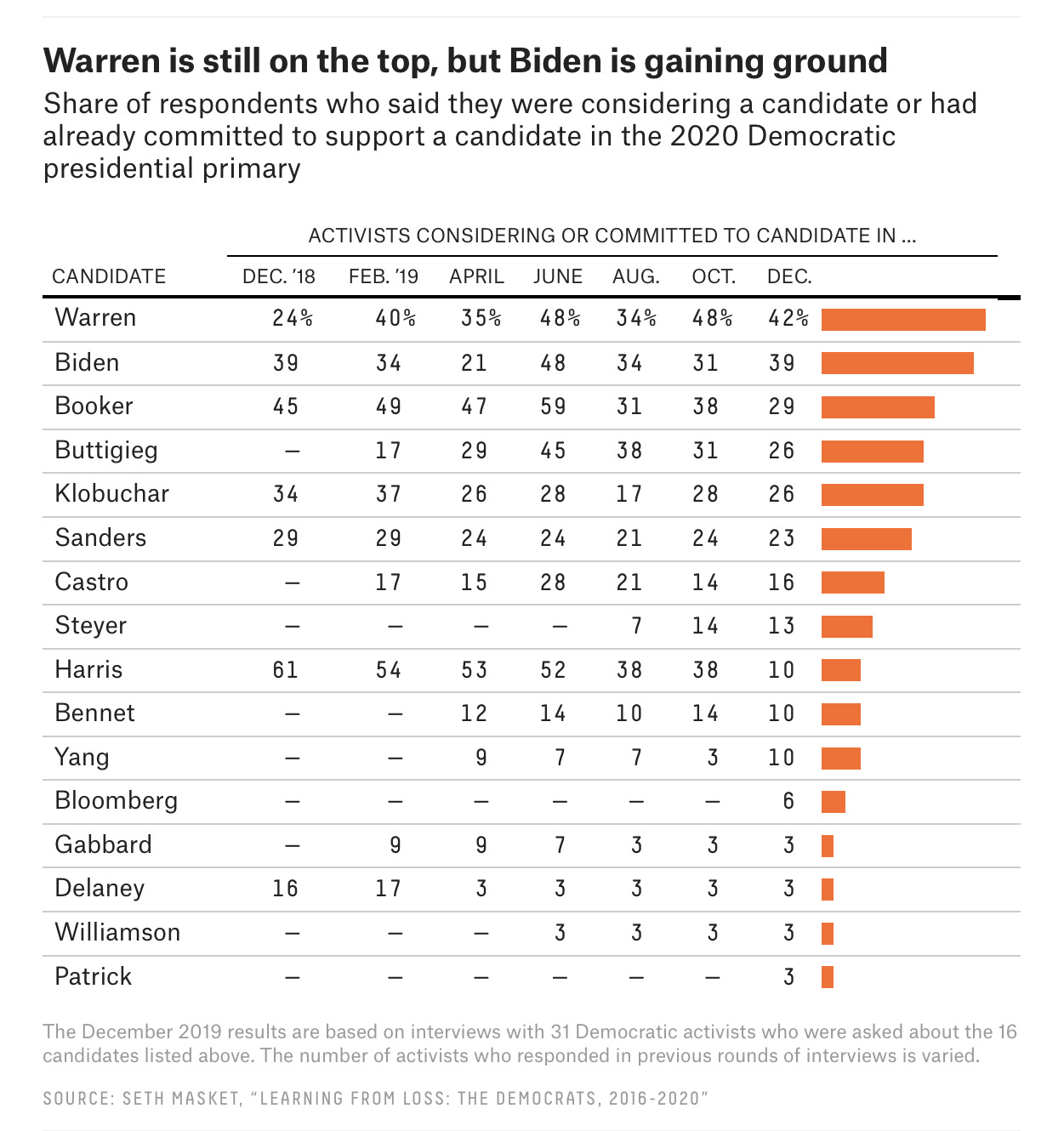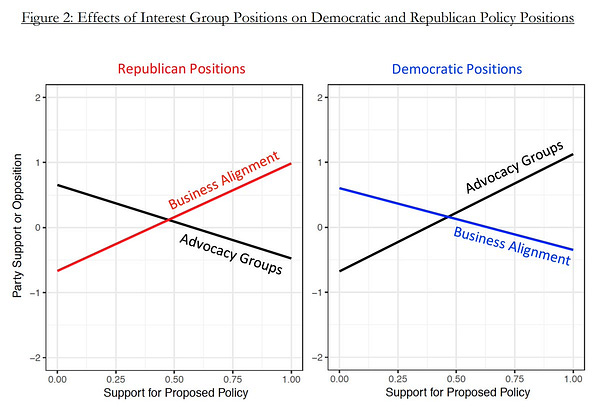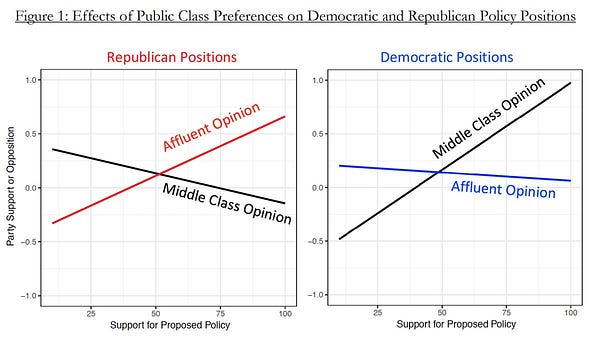January 5, 2020 📊 A war with Iran probably won’t help re-elect Trump
Partisan lenses and a history of conflict in the Middle East blunts the impacts of additional tension
Welcome! I’m G. Elliott Morris, data journalist for The Economist and blogger of polls, elections, and political science. Happy Sunday! This is my weekly email where I write about politics using data and share links to what I’ve been reading and writing. Thoughts? Drop me a line (or just respond to this email). Like what you’re reading? Tap the ❤️ below the title and share with your friends!
Dear Reader,
This week’s main read: I want to take a break from the 2020 presidential primary this week and walk through why I think it’s a misguided assumption that a war with Iran would benefit president Trump.
Plus, let’s talk about the role that party activists are playing in the Democratic race, and about the different interest groups that shape policy adoption among the two political parties.
Thanks all for reading my weekly email. Please consider sharing online and/or forwarding to a friend. The more readers, the merrier! If you’re shy, the best way you can support my newsletter is to press the heart button below the title (this makes it rank higher in Substack’s curation). If you’d like to read more of my blogging I publish subscriber-only content 1-3x a week on this platform. Click the button below to learn more!
—Elliott
A war with Iran probably won’t help re-elect Trump
Partisan lenses and a history of conflict in the Middle East blunts the impacts of additional tension
Let’s take a little break from the 2020 primary this week and instead talk about the other big story right now, a seemingly-imminent direct conflict with Iran. Unless you live under a rock, you know that last week the US assassinated Iran’s Gen. Qasem Soleimani, the country’s highest-ranking military commander. The strike has caused immediate speculation about an all-out war with Iran—some people are even making memes about World War 3, which seems silly—and about political fallout from the strike.
In particular, some analysts seem convinced that Donald Trump will “benefit” electorally from the strike. Wars cause a country to become unified, they reckon. 7People “rally around the flag” and give improved ratings to the Commander in Chief. And after all, war-time presidents tend to do well electorally. The country didn’t toss out FDR or Wilson, for example, and George W. Bush saw a huge surge in support after 9/11. Of course, it tanked after the invasions of Afghanistan and Iraq—but they might not mention this fact.
But these so-called “rally-round-the-flag effects” don’t come equally to all who seek them. Though Trump literally tweeted a picture of the American flag after the strike against Soleimani became public knowledge, I’m not so sure he’ll get one. For one thing, we are more polarized than we were under our 20th-century presidents, or even under Bush. Public approval for the president’s foreign policy actions looks much like his overall approval ratings—high among Republicans and low among Democrats. (And oh, yeah, just think about all those hawkish Democrats out there that will suddenly be persuaded by the air-strike to get behind the president.)
Second, war with Iran—or even conflict in the Middle East more broadly—is relatively unpopular today. And go figure! Americans have spent nearly two decades watching endless media coverage of the back-and-forth over political control of the region. We’ve watched two war-like conflicts and a prolonged struggle with ISIS and other terrorist groups unfold on national television. And people are particularly unhappy about the prospect of war with Iran; only 20% of adults voiced support for it in a September poll from the University of Maryland.
In sum, it seems foolish to me to assume that a war with Iran will help the president politically or electorally. Maybe I’ve missed something here, but the lessons we’ve learned about partisan motivated reasoning over the past decade suggest that very little will change voters’ minds about the president. Given the current state of public opinion regarding the Middle East, it seems especially unlikely that a war with Iran is the event that can do so.
And here are some selected links to the work I read and wrote last week:
Posts for subscribers:
January 3, 2020: The Democrats' fundraising numbers are nuts. These data are the most optimistic sign for Bernie Sanders's campaign
December 30, 2019: Joe Biden’s hopeless embrace of bipartisanship. Ideological polarization has decreased shared partisan beliefs and increased the electoral punishment for cooperation
Links and Other Stuff
Activists in the 2020 primary
Seth Masket has a piece out at FiveThirtyEight this week about how Democratic Party activists might be warming to Biden as their favored nominee. This table is particularly telling:

Masket also provides some data on who activists don’t want as their nominee:
… this metric contains a bit of good news for Biden, who is now only opposed by five of 31 activists (16 percent), down from 24 percent (seven of 29 activists) in October and 31 percent (nine of 29 activists) in August. This doesn’t mean that Biden has pacified all his detractors, but it is telling that his opposition number has decreased while his support has slowly ticked upward; party insiders may well be warming to him.
But one main takeaway remains: activists, like “the party” as a mythical omniscient institutional being, remain undecided.
Who parties listen to
This is an old, if not re-invigorated, question in political science. Matt Grossmann and William Isaac have a newly-accepted paper about this in the Journal of Politics. According to the authors, Republicans listen to business interests while Democrats listen to advocacy groups.



What I'm Reading and Working On
I’m formally back from holiday break tomorrow and hard at work modeling state-level public opinion. We’ll also have some 2020-related announcements to share later on.
Thanks for reading!
Thanks for reading. I’ll be back in your inbox next Sunday. In the meantime, follow me online or reach out via email. I’d love to hear from you!
If you want more content, I publish subscribers-only posts on Substack 1-3 times each week. Sign up today for $5/month (or $50/year) by clicking on the following button. Even if you don't want the extra posts, the funds go toward supporting the time spent writing this free, weekly letter. Your support makes this all possible!



